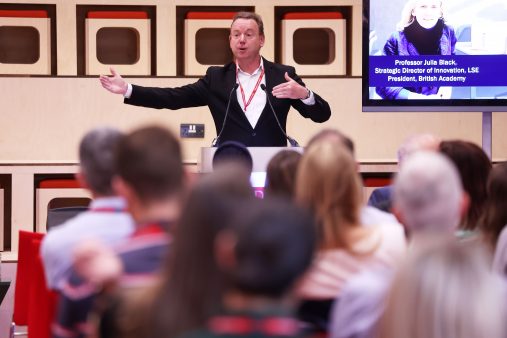Building a better society
1 August 2022
Society’s newest ‘superlab,’ sbarc|spark, opened its doors in March. A torch-bearer for the power of social science research-led innovation, sbarc|spark brings experts together with external partners to create answers to the world’s ills, offering an ‘outside-in’ approach to building a better society.
Sir Geoff Mulgan is Professor of Collective Intelligence, Public Policy and Social Innovation at University College London (UCL). The former Chief Executive of Nesta, the UK’s innovation foundation, joined Cardiff University for sbarc’s stakeholder launch. Here, in extracts from an audio interview, Geoff shares his reflections on the challenges ahead.

“For me, it’s really exciting to see spark lifting off. I had some involvement a few years ago in the earlier stages of the project, partly through involvement in creating the Y-Lab with Nesta and also working with the Cardiff Capital Region on their strategy.
And I see the sbarc|spark model as absolutely vital for the next 20 or 30 years of social science. We need social science to be getting out of university settings, engaging in practical problem solving, working with government, working with business, working with civil society on the huge challenges we have ahead, that include transition to a zero carbon economy, cutting inequality, dealing with AI and a host of other challenges.
But equally we need to welcome society into the university, giving groups space in buildings like this so that people get to understand each other. Cross-pollination and combination are vital to all innovation: bringing things together in novel ways. And experience shows that physical proximity and co-location can greatly accelerate innovation.
We’ve had decades of experience of science doing this through science parks, life science centers and so on. Now, at last, social science is doing the same. And my hope is that every big university should have something like this. I think they all will be envious of Cardiff. The physical surroundings are fantastic, and can nurture the relationships which then spark new knowledge.
I think universities and research councils need to somewhat rethink how they use money, how they use buildings, how they reward different career trajectories. At the moment, too many of the pressures are too linear, siloed within disciplines, with a peer reviewed article sometimes seen as the only relevant output. So we need all the players who shape the ecosystem of academia to rethink the influence they’re having so they encourage more collaboration, more problem solving, and more impact in the world.
That’s going to be quite a challenge. Most of the current structures and systems don’t help. The career pressures for many younger social scientists are not about being creative and dynamic in the world – even though that’s what we need so desperately. Instead, young researchers are often told to just publish and talk about their papers and printed outputs. And analysis of the present and past is greatly encouraged relative to work on the future. At the moment there is little encouragement for working on designs or options for a generation from now – in stark contrast to other areas of science.
When change is led in a building like this, it has to be porous, or ‘outside-in’ as much as ‘inside-out’, nurturing a community where people get to know each other and work together. But it needs to also open its doors all the time, open its doors to students, open its doors to cross-sectoral teams working on problems, open its doors sometimes to the wider public, have big events on challenges like food, obesity or aging. It needs to be a convener and curator of really exciting, dynamic conversations.
That’s what you can do with a space like this. And I hope you can show leadership in the next era of social science that mobilises brains and energies to help us navigate the great societal changes of our times.”
Sir Geoff Mulgan’s latest book, Another World Is Possible, discusses how social and political thinking can help us reimagine the future, explains how lessons from our past and collective intelligence could be used to build a better future.